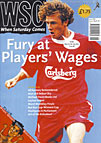 The latest political attempts to counter hooliganism are a step too far, argues Stan Pearce
The latest political attempts to counter hooliganism are a step too far, argues Stan Pearce
As the political landscape of the country has changed – so runs the conventional wisdom – so has the attitude of Westminster to football. However, anyone who believed that Trade Secretary Stephen Byers’s decision to prevent the takeover of Manchester United by Rupert Murdoch signalled another stage in the evolution of politicians’ thinking towards the game should have witnessed a low-key debate in the House of Commons in the week of the Byers decision.
As the political landscape of the country has changed – so runs the conventional wisdom – so has the attitude of Westminster to football. However, anyone who believed that Trade Secretary Stephen Byers’s decision to prevent the takeover of Manchester United by Rupert Murdoch signalled another stage in the evolution of politicians’ thinking towards the game should have witnessed a low-key debate in the House of Commons in the week of the Byers decision.
As the political landscape of the country has changed – so runs the conventional wisdom – so has the attitude of Westminster to football. However, anyone who believed that Trade Secretary Stephen Byers’s decision to prevent the takeover of Manchester United by Rupert Murdoch signalled another stage in the evolution of politicians’ thinking towards the game should have witnessed a low-key debate in the House of Commons in the week of the Byers decision.
While much of the bill concerns the strengthening of regulations on matters such as racist chanting – with which no one could disagree – the potential extension of domestic and international banning orders to what were described as “unconvicted football hooligans” should cause raised eyebrows everywhere. In essence, fans unconvicted of any offence could in future have their passports confiscated on the basis that the police and the courts believe they might get up to no good.
Burns got off to a flier in the debate, telling startled MPs that they owed it to all “decent, law-abiding football hooligans” to implement the bill. How true that is. The debate was held on April 16th, the day after the Anfield memorial service for the dead at Hillsborough. Sadly, but all too predictably, it took a mere three minutes for Lichfield’s eccentric Tory MP Michael Fabricant to make the unforgivable link between a bill concerned with football hooliganism and the tenth anniversary of the disaster. That was bad enough; the fact that the hapless Fabricant initially referred to the tenth anniversary of Heysel was simply lamentable.
Surprisingly, it took a couple of representatives of the flog-’em-and-hang-’em tendency of the Tory party to point out that banning unconvicted individuals from travelling abroad had constitutional and human rights implications. Eric Forth, a minister in the Thatcher government not previously known for his keen interest in civil liberties, said that the proposal was “akin to the old Soviet Union”. Keen bible-thumper David Maclean, another former Tory minister, also emerged as an unlikely champion of the Barmy Army.
A feature of the debate was the introduction of the catchphrase “football-related incident”. This appeared to be a strange, undefinable event in which one or many thousands of people could participate and which would now lead irrevocably to arrest, banning orders and passport withdrawal. A Leeds fan, for example, chucking a half-brick at a Manchester United supporters’ bus would seem to be a clear example. But what about two Newcastle and Sunderland fans – again, purely an example – taunting each another in a bar in Tenerife while wearing their club shirts? Surely “drink- related incident” would have been a more accurate description of what the Commons was trying to proscribe?
Michael Fabricant, after lauding the entrepreneurial spirit of ticket touts as a fine example of the free market in action, commendably pointed out that legislation should not encroach on the rights of individuals “regardless of whether we think that they might be football hooligans”. He then asked whether the law could be changed so that a British citizen who committed a crime in another country could be arrested, charged and prosecuted in the UK for the crime.
That may seem a legitimate course of action in the case of a boozed-up halfwit who has smashed up a bar in Marseille, but it might be a little harder to prosecute cases on less clear-cut matters. No matter, though, seemed to be the sentiment; a “football-related incident” surely warranted the suspension of most concepts of justice and the rule of law.
The House of Commons could debate and legislate on many matters concerning football should it wish: anti-competitive practices in the Premiership; television’s all-consuming dominance over the game; the bigger clubs’ ruthless exploitation of the paying customer, to name but three. But no, all attention is focused on attempting to legislate out of existence a dreaded “small minority” of fans whose adherence to and acknowledgement of the law at present is almost non-existent, but with whom, in the eyes or MPs, we are all inextricably linked.
Perhaps we should not be too surprised to find that little has changed after all.
From WSC 148 June 1999. What was happening this month